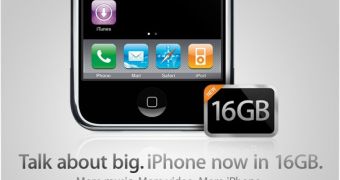Apple is facing a $5 million (€4.17 million) lawsuit in California after two Miami residents decided to draw attention to the company’s advertising practices, particularly those involving the entry-level 16GB iPhone.
A topic that has seen quite a bit of press, the advertised storage fiasco is something other companies have had to fend off as well. That includes Microsoft, whose Surface tablets have been the object of a similar lawsuit for offering only half of the advertised storage space.
Apple’s 16GB iPhones actually offer around 12GB of storage, sometimes even less (if the customer is on the newest firmware, for instance). While most people are content with this situation, two Miami residents felt deceived and actually went and sued Apple for it.
Company allegedly forcing users to buy iCloud storage
The two plaintiffs said in their complaint that, “Apple's misrepresentations and omissions are deceptive and misleading because they omit material facts that an average consumer would consider in deciding whether to purchase its products.”
The duo believe the Cupertino company "exploits" the situation by offering to sell iCloud storage for when the iDevice becomes full. Apple currently offers 5GB of free iCloud space, with plans ranging between 20GB and 1TB. The 20GB plan sells for as low as $0.99 / €0.99 per year, while the high-end plan sells for $19.99 / €19.99.
16GB not what it used to be
When the original iPhone was introduced, Apple sold units that had as little as 4GB of storage. As the years progressed, Apple eventually bumped up the entry-level quota to 8GB and 16GB respectively. It has remained there for the past four years, all while photos, videos and apps grew in size and abundance.
Whether or not this lawsuit will end with Apple coughing up the $5 million (€4.17 million) sought by the plaintiffs, you can expect next year’s iDevices to start at 32GB. Or at least a more visible asterisk on the quoted storage for next year’s iPhones and iPads.

 14 DAY TRIAL //
14 DAY TRIAL //